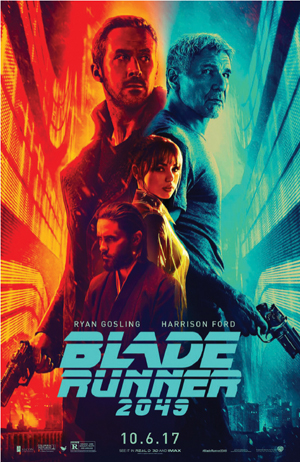Posted on Oct 31, 2017 in
MOVIES
FAMILY NIGHT AT THE MOVIE | By Christopher Hill –
 What does it mean to be human, to have a soul, to be alive? Today, we merely look in a mirror and know that we are, and we do. However, science fiction has a way of evolving into science fact. Technology has always been the lead dog with morality struggling to catch its tail. In the world of Blade Runner, the struggle between the two is poised to destroy or save their society, depending on their viewpoint.
What does it mean to be human, to have a soul, to be alive? Today, we merely look in a mirror and know that we are, and we do. However, science fiction has a way of evolving into science fact. Technology has always been the lead dog with morality struggling to catch its tail. In the world of Blade Runner, the struggle between the two is poised to destroy or save their society, depending on their viewpoint.
Based on a book called Do Androids Dream of Electric Sheep? by Philip K. Dick, the original Blade Runner created a world not quite dystopian but controlled by corporations and an all-seeing police force. It was a dark and gritty domain, where Blade Runner Rick Deckard (Harrison Ford) hunted replicants — engineered humans designed as a slave race to colonize worlds. Programed with a specific four-year lifespan, they rebelled against their design and were on earth looking for ways to extend their existence. Deckard stops the replicants, but in doing so, he begins to question his humanity. The audience is left to wonder what are the conditions for humanity in the abstract, and in particular, it was left unclear if Deckard himself is a replicant.
Blade Runner 2049 further develops these themes and adds additional questions, which are theoretical in our day, but to this world could be threatening to the community. We meet a new Blade Runner Officer K (Ryan Gosling), also on the hunt for replicants in hiding. Investigating a case, he discovers a collection of bones from a woman who died during childbirth. What draws Officer K into a mystery is his discovery that the bones belonged to a replicant.

Ana De Armas as Joi and Ryan Gosling as K in Alcon Entertainment’s action thriller Blade Runner 2049.
The replicants were not designed for procreation nor was the technology available. A birth would be impossible, miraculous and earth-shattering. The clearest difference between machines and man is procreation. If a machine were able to do that, then you would have to question the validity of replicants being subhuman. Then you would have to look at the moral implications of their inequality. Thus begins his quest to understand how something impossible was made possible: a quest that leads him to the reclusive Rick Deckard — no longer a Blade Runner. Now, he’s just a man who has secrets that could upend their society.
Pulling off a quality sequel is difficult, but with the first film considered a cult classic and a distance of more than 35 years since the original, the idea that they could recreate and expand this universe became a true Herculean task. Visually, the original was groundbreaking. The story raised complex themes of humanity and forced audiences to think and understand with little exposition to guide them. For Blade Runner 2049, they solicited the directorial services of Denis Villeneuve. His work on Arrival in 2016 was able to marry mood, tone, pacing and intelligent writing to create a best-film nomination.
His inspired work there carries over into Blade Runner 2049. Right from the opening shots, the complex visual nature of the world is highlighted. The world is bleak, and you feel the isolation and societal disconnect. However, you also get to see humanity’s longing to belong. Agent K’s passionless performance is spot-on. He is a cold person set adrift in an uncaring world, but even he still looks to develop a relationship — a nonconventional relationship, which also brings with it the concept of what life is meant to incarnate.
Blade Runner 2049 is a beautiful film with very complex questions bubbling above and below the surface. It will make you think. And you will have a lot of time to do so, as the film runtime is nearly three hours. While much of that is necessary mood-enhancing imagery, there is still a fair amount of self-indulgent gratification that could have been easily cut to create a less involved commitment without taking away from the storytelling. That gratification leaks into the sound department, as certain reveals are met with a crescendo that belies the actual size of the reveal. No Sixth Sense moments here. Once the concept it laid down, the main storyline is somewhat predictable and linear.
Those minor quibbles aside, the film is beautifully crafted and intelligently written. The concepts presented are challenging, and without much expositional regurgitation, the film begs for multiple viewings. Blade Runner 2049 is a fantastic reentry to this world. One hopes that it will not be 35 more years before another.
Blade Runner 2049
Now Showing: In Theaters
Rated: R
Violence: Yes, death and dismemberment. Some is shown off-screen but blood injuries are prevalent.
Language: Yes
Sexuality: Yes, scenes of intimacy and nudity.

 <
<







 What does it mean to be human, to have a soul, to be alive? Today, we merely look in a mirror and know that we are, and we do. However, science fiction has a way of evolving into science fact. Technology has always been the lead dog with morality struggling to catch its tail. In the world of Blade Runner, the struggle between the two is poised to destroy or save their society, depending on their viewpoint.
What does it mean to be human, to have a soul, to be alive? Today, we merely look in a mirror and know that we are, and we do. However, science fiction has a way of evolving into science fact. Technology has always been the lead dog with morality struggling to catch its tail. In the world of Blade Runner, the struggle between the two is poised to destroy or save their society, depending on their viewpoint.